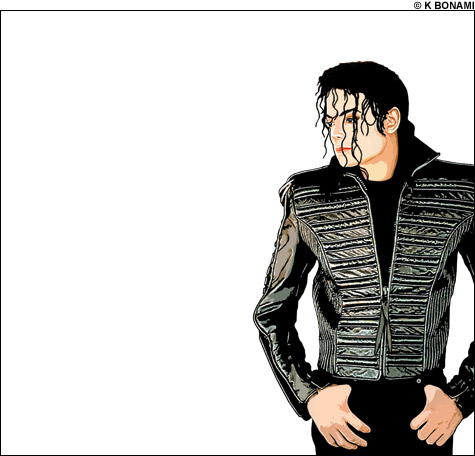
GONE TOO LATE: Mourning Jackson felt oddly overdue, as if the sudden death he'd suffered 24 hours earlier were nothing compared to the slow one he'd been undergoing for the previous 24 years. |
The day after Michael Jackson died, I was in line at the supermarket. The tabloids were still dumb on the matter, but the aisles were ablaze. A man in front of me was unloading 12 bottles of Pepsi onto the conveyor and going on about it to the cashier, how Jackson had just died, how he wasn't a fan himself, how no one he knew could believe it . . .
". . . . but you know," he said, pausing to make sure he had listeners, "he did it to himself. All those drugs." His tone was one of familiar disappointment, as though years worth of his gentle warnings to Michael had gone ignored — and now look what had happened. Through this, the cashier fixed her glare on the wad of crumply ones he'd handed her, keeping it together until such time as he'd waddled off. When he did, she looked to the ceiling, released a long groan, turned slowly back toward me, smiled, and scanned my Shaw's card.
"I don't like people saying he did it to himself," I offered. "I don't know why I don't like it, but I don't."
"No. I don't like it either," she said. "It was everybody else that did it."
I wanted to ask her whether she felt the same sense of relief that I did. If she thought this mourning felt oddly overdue, as if the sudden death he'd suffered 24 hours earlier were nothing compared to the slow one he'd been undergoing for the past 24 years. But a line was forming behind me, more people buying more Pepsi, so I nodded and left.
At home, the TV was already on in the corner. All day it had been spilling hour after live hour of "everybody else," what Jackson referred to as "the incredible, terrible media," teams upon teams of precision-saddened anchors either leaking speculative sotto voce autopsy augury or getting swept up in selectively forgetful austerity. It was like watching a puppy realize the mouse he'd been using as a toy was now crushed beneath his paw.
That morning, the headlines roared from their boxes, everything from tacky salvos — "JACKO DEAD" (the Sun, the Daily Mirror) — to uniquely atrocious punnage — "FADE TO BLACKO" (from our own Herald). But news goes fast: just a half-hour away from the Holmby Hills home where Jackson collapsed, the LA Times required only two days to buck up (after having to confirm a TMZ scoop) and burp up a tactless blog post from "Dish Rag" columnist Elizabeth Snead, hurrying to wonder "Was Michael Jackson Worth More Dead Than Alive?" — the assertive past tense weirdly suggesting he's already proceeded well beyond death itself.
It's tempting to take all of these media 180s — the clumsily woven scraps of tender tribute, the inadequate compressions of his bio — as proof that this is the same sad media that created Michael Jackson to destroy him while never really getting him, the same media that treated him like Peter Pan while regarding him as Joseph Merrick. But Jackson was also the first important artist who sold out hard and rubbed it in my face, and that was his choice.
Ten years after a young Michael sang "whatever it takes I'm willing to do" on Soul Train, he was altering the lyrics of "Billie Jean" to jazz up the Pepsi Generation. Then his hair caught fire. It was then, at the age of eight, that I felt my understanding of Michael Jackson split into the two distinct halves I'd maintain until now, when neither remains. There was the living, breathing, singing, spinning physical Michael whom I last spotted in white lounging across the panels of my Thriller cassette's sleeve. And there was the image, the idea, the commodity, the malleable likeness and willful spectacle of Jackson. We surrendered to the former; he surrendered to the latter.
Given that the last half of his life was increasingly characterized by his surreal removal from a musical culture largely grown from his gifts, it's not surprising that he's often most fully present when realized through others. Jeff Koons found humanity in his alien extravagance. The impersonator protagonist of Harmony Korine's Mister Lonely found sustenance in his image. Pepsi found lots of money just by casting crowds to chase him.
Real stars burn out long before they actually disappear, and when they do, it's not for us to replace them — rather we have to redraw our constellations. On behalf of the media, I'd like to apologize for how badly we handled his life and hope that we can be better custodians of his future as a memory. Jackson had an unknowable power within him, but even he couldn't ruin a life so big all by himself. This drag was a team effort: us, him, and human nature.
Click here for more on Michael Jackson from the Phoenix archives.